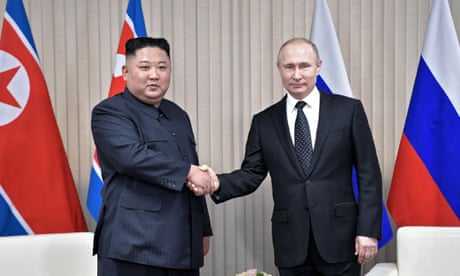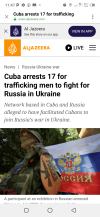ChoiceVariable
JF-Expert Member
- May 23, 2017
- 43,100
- 49,795
Ukraine imeendelea kutembea kichapo Cha haja Kwa Warusi Hadi wameishiwa silaha na Sasa wameenda Korea Kaskazini kupiga magoti wapewe Msaada na kuuziwa silaha.
Lakini Marekani iwewaonya Korea Kaskazini kwamba Wakifanya hivyo watakumbana na matokeo makubwa.
Awali akiwa Kiev , Waziri wa Mambo ya Kigeni wa USA alitangaza Msaada zaidi wa silaha na pesa Kwa Ukraine ikiwemo kitita kipya Cha makombora yenye uwezo wa kubeba vichwa vya Nyukilia.
My Take
Maji yamemfika Shingoni Russia ila Warusi wa Buhigwe Bado wamekaza gubu 😆😆😆
==========
After years of backing UN sanctions targeting North Korea’s nuclear weapons programme, Russia is now reaching out to its neighbour for help. The war in Ukraine has forced the Kremlin to reassess its relationship with Pyongyang as it seeks to secure weapons to replace its own depleted stocks.
A possible meeting between Vladimir Putin and Kim Jong-un later this month in the eastern Russian city of Vladivostok would add geopolitical substance to the symbolic meeting of minds that has unfolded between the leaders of the pariah states over 18 months of fighting in Ukraine.
With Russia quickly using up its munitions, Putin is expected to build on recent high-level diplomatic exchanges, including a visit to the North by his defence minister, Sergei Shoigu, to secure North Korean artillery shells and antitank missiles.
In return, North Korea is hoping to receive valuable foreign currency to continue funding its development of intercontinental ballistic missiles – its trump card in its quest to secure concessions, and recognition as a legitimate nuclear state, from the US.
Closer ties between Moscow and Pyongyang extend beyond bartering for bullets, however. Russia’s growing isolation has sent it in a new, worrying direction as it seeks to build a united front against a “hostile” west that includes China and now, it seems, North Korea and its million-strong army. As news emerged of Kim’s possible trip to Vladivostok, media reported that the North could take part in joint naval drills with Russia and China.
“Why not, these are our neighbours,” Shoigu said this week when asked about the exercises, according to Russia’s Interfax news agency. “There’s an old Russian saying: you don’t choose your neighbours and it’s better to live with your neighbours in peace and harmony.”
Russia’s decision to turn to North Korea for weaponry is a sign of rapidly shifting dynamics in the countries’ relations since Kim’s grandfather, Kim Il-sung, founded the North in 1948 with the backing of the Soviet Union.
North Korea later received support from Beijing and Moscow during the 1950-53 Korean war, and was heavily reliant on Soviet aid for decades. The collapse of the Soviet Union in the 1990s contributed to a deadly famine in the North in which as many as three million people died.
In the years after Kim Jong-un came to power following the death of his father, Kim Jong-il, in late 2011, both Moscow and Beijing supported UN sanctions designed to force the North Korean leader into abandoning his ballistic missile and nuclear programmes.
It was only after the North conducted its last nuclear test, in 2017, that Kim set about mending ties, meeting Putin for the first time in 2019, as hopes for a diplomatic breakthrough on nuclear weapons turned to resignation after Kim and Donald Trump failed to settle their differences over sanctions relief.
In a message to Putin to mark Russia’s national day in June this year, Kim pledged his regime’s “full support” for the invasion of Ukraine, and vowed to “hold hands” with the Russian leader in their common aim to build “a powerful country”. The North is also one of only two UN member states, in addition to Russia, to have recognised the independence of Russian-claimed Ukrainian regions.
“Moscow’s ‘special military operation’ in Ukraine has ushered in a new geopolitical reality in which the Kremlin and (North Korea) may become increasingly close, perhaps even to the point of resurrecting the quasi-alliance relationship that had existed during the cold war,” Artyom Lukin, a professor at Far Eastern Federal University in Vladivostok, wrote in a report for 38 North.
If the meeting takes place, Putin could find himself confronted by a tough negotiator, according to John Everard, Britain’s ambassador to North Korea from 2006 to 2008. Pyongyang knows that Moscow is desperate for munitions, Everard told the BBC, adding that he expected North Korea to demand an “eye-wateringly high” price.
The last time Kim’s armoured train rolled into Vladivostok four years ago, he was welcomed with a traditional offering of salt and bread. But Putin’s troubled war in Ukraine means that on his next visit, Kim will be the one bearing gifts.
The Guardian
Lakini Marekani iwewaonya Korea Kaskazini kwamba Wakifanya hivyo watakumbana na matokeo makubwa.
Awali akiwa Kiev , Waziri wa Mambo ya Kigeni wa USA alitangaza Msaada zaidi wa silaha na pesa Kwa Ukraine ikiwemo kitita kipya Cha makombora yenye uwezo wa kubeba vichwa vya Nyukilia.
My Take
Maji yamemfika Shingoni Russia ila Warusi wa Buhigwe Bado wamekaza gubu 😆😆😆
==========
After years of backing UN sanctions targeting North Korea’s nuclear weapons programme, Russia is now reaching out to its neighbour for help. The war in Ukraine has forced the Kremlin to reassess its relationship with Pyongyang as it seeks to secure weapons to replace its own depleted stocks.
A possible meeting between Vladimir Putin and Kim Jong-un later this month in the eastern Russian city of Vladivostok would add geopolitical substance to the symbolic meeting of minds that has unfolded between the leaders of the pariah states over 18 months of fighting in Ukraine.
With Russia quickly using up its munitions, Putin is expected to build on recent high-level diplomatic exchanges, including a visit to the North by his defence minister, Sergei Shoigu, to secure North Korean artillery shells and antitank missiles.
In return, North Korea is hoping to receive valuable foreign currency to continue funding its development of intercontinental ballistic missiles – its trump card in its quest to secure concessions, and recognition as a legitimate nuclear state, from the US.
Closer ties between Moscow and Pyongyang extend beyond bartering for bullets, however. Russia’s growing isolation has sent it in a new, worrying direction as it seeks to build a united front against a “hostile” west that includes China and now, it seems, North Korea and its million-strong army. As news emerged of Kim’s possible trip to Vladivostok, media reported that the North could take part in joint naval drills with Russia and China.
“Why not, these are our neighbours,” Shoigu said this week when asked about the exercises, according to Russia’s Interfax news agency. “There’s an old Russian saying: you don’t choose your neighbours and it’s better to live with your neighbours in peace and harmony.”
Russia’s decision to turn to North Korea for weaponry is a sign of rapidly shifting dynamics in the countries’ relations since Kim’s grandfather, Kim Il-sung, founded the North in 1948 with the backing of the Soviet Union.
North Korea later received support from Beijing and Moscow during the 1950-53 Korean war, and was heavily reliant on Soviet aid for decades. The collapse of the Soviet Union in the 1990s contributed to a deadly famine in the North in which as many as three million people died.
In the years after Kim Jong-un came to power following the death of his father, Kim Jong-il, in late 2011, both Moscow and Beijing supported UN sanctions designed to force the North Korean leader into abandoning his ballistic missile and nuclear programmes.
It was only after the North conducted its last nuclear test, in 2017, that Kim set about mending ties, meeting Putin for the first time in 2019, as hopes for a diplomatic breakthrough on nuclear weapons turned to resignation after Kim and Donald Trump failed to settle their differences over sanctions relief.
In a message to Putin to mark Russia’s national day in June this year, Kim pledged his regime’s “full support” for the invasion of Ukraine, and vowed to “hold hands” with the Russian leader in their common aim to build “a powerful country”. The North is also one of only two UN member states, in addition to Russia, to have recognised the independence of Russian-claimed Ukrainian regions.
“Moscow’s ‘special military operation’ in Ukraine has ushered in a new geopolitical reality in which the Kremlin and (North Korea) may become increasingly close, perhaps even to the point of resurrecting the quasi-alliance relationship that had existed during the cold war,” Artyom Lukin, a professor at Far Eastern Federal University in Vladivostok, wrote in a report for 38 North.
If the meeting takes place, Putin could find himself confronted by a tough negotiator, according to John Everard, Britain’s ambassador to North Korea from 2006 to 2008. Pyongyang knows that Moscow is desperate for munitions, Everard told the BBC, adding that he expected North Korea to demand an “eye-wateringly high” price.
The last time Kim’s armoured train rolled into Vladivostok four years ago, he was welcomed with a traditional offering of salt and bread. But Putin’s troubled war in Ukraine means that on his next visit, Kim will be the one bearing gifts.
The Guardian

